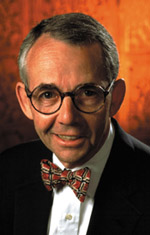 On
the shelf
On
the shelf
On
the Shelf
Prickly pamphlets with titles
like "New Consensus for Old: Cultural Studies from Left to Right" by
Baffler editor Thomas Frank, AM'89, PhD'94, and "Secret Sins of Economics"
by former U of C faculty member Dierdre McCloskey form the output of Prickly Paradigm
Press. Started as the Prickly Pear Press in 1993 by two British anthropologists,
the series has been revived by Marshall Sahlins, the Charles F. Grey distinguished
service professor emeritus in anthropology, and is distributed through the University
of Chicago Press, with the first five titles out this summer. Here's an excerpt
from Sahlins's contribution, "Some Laws of Civilization," an update
of "Waiting for Foucault, Still," which appeared in the original series:
"First
law of civilization: All airports are under construction.
Second
law of civilization: I'm in the wrong line.
Third
law of civilization: Snacks sealed in plastic bags cannot be opened, even using
your teeth.
Fourth law of civilization: The human
gene whose discovery is announced in the New York Times-there's one every day,
a gene du jour-is for some bad trait, like schizophrenia, kleptomania, or pneumonia.
We have no good genes.
Fifth law of civilization:
Failing corporate executives and politicians always resign to spend more time
with their families."
 |
| photo
by Dan Dry |
As American
as mom and apple pie-that's snobbery. In Snobbery: The American Version
(Houghton Mifflin, 2002) essayist Joseph Epstein, AB'59, details the new forms
of affectation in a world where not being a WASP has lost its sting. Epstein is
unafraid to confess his personal transgressions. In the opening chapter, "It
Takes One to Know One," he charts the influences, including the U of C, that
shaped his own snobbish nature:
"One
of the most astonishing things of all was that the University of Chicago was not
founded on status-which is also to say, on snobbery-at least not as I had been
hitherto accustomed to it. People were not ranked by physical beauty, or athletic
skill, or wealth, or family connections. None of these things seemed to matter.
All that did was intelligence-or more precisely, intellectuality, which I would
define as the ability to deal in a sophisticated way with the issues, questions,
and problems presented by art, science, politics, and things of the mind generally.
Since my own intellectual quality was then of a low order, my status as a student
at the University of Chicago was commensurately low. Hiding my ignorance as best
I could, I looked on, fascinated. Here was a new game, and one I felt, if then
still somewhat inchoately, I wanted to play."


![]() Contact
Contact
![]() About
the Magazine
About
the Magazine ![]() Alumni
Gateway
Alumni
Gateway ![]() Alumni
Directory
Alumni
Directory ![]() UChicago
UChicago![]() ©2002 The University
of Chicago® Magazine
©2002 The University
of Chicago® Magazine ![]() 5801 South Ellis Ave., Chicago, IL 60637
5801 South Ellis Ave., Chicago, IL 60637![]() fax: 773/702-0495
fax: 773/702-0495 ![]() uchicago-magazine@uchicago.edu
uchicago-magazine@uchicago.edu
